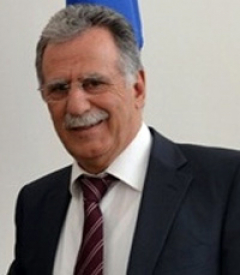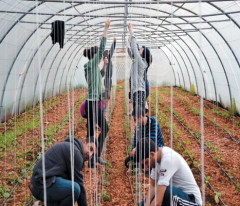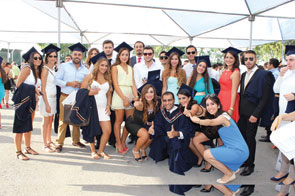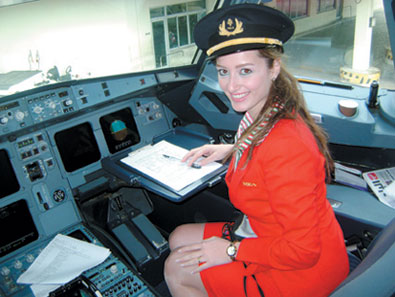Associate Dean of Issam Fares Faculty of Technology in UOB
Dr. Elias Khalil
Associate Dean of Issam Fares Faculty of Technology in UOB
Holder of a PhD in Electronic Engineering from France, and deeply experienced in the field of teaching and research in France, Abidjan, and Tunisia, Dr Elias Khalil established the Issam Fares Faculty of Technology in the University of Balamand in 2010.
What is the value added by Issam Fares Faculty of Technology, University of Balamand, to higher education in Lebanon, especially in the field of technology?
Of value is the Faculty’s whole approach to education, comprising:
• The careful following up and individual monitoring of every student
• The solving of operational problems and a high level of achievement
• Twenty weeks of internship for students in companies in Lebanon or abroad, representing among other things a boost to employment opportunities
• Instruction by expert teachers/researchers in the field of engineering, science and technology
• Continuous upgrading of faculty laboratories
To what extent is the faculty curriculum compatible with the ongoing progress of today’s technological revolution?
The educational philosophy of the Faculty springs from two important principles:
• The need for higher education in the field of technology, leading to a constant flow of graduating students skilled in various areas of the field
• The importance of practical internship, enabling such graduates to have practical experience in their area of specialism
The Faculty will play a vital role in the ongoing development of this revolution by making possible fluent communication between teacher and student, essential if the flow of graduating students is to be fully skilled and experienced in the many aspects of technology. New and innovative programs and areas of specialization will add professional value to this flow, ensuring that it represents and provides cutting-edge expertise, which in turn will contribute towards the modernization of industry and further productive research. Such dynamic is seldom seen in other universities, many of which resist change and stick to traditional programs.
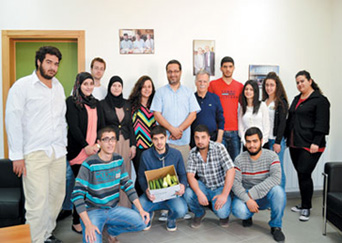
Does the Faculty offer programs and modern technical systems on a par with those offered by international and local academic institutions in terms of meeting employment needs in Lebanon?
The Faculty of Technology owes its existence to the University of Balamand, its foundation, development and capabilities, and more specifically to the Faculty of Engineering. The relevant university personnel have done much in the way of opening doors of cooperation with Lebanese companies and enterprises in both the private and public sectors.
At the international level, we have agreements of collaboration with many European universities, especially ones in France and Romania. These agreements, relating to research, curriculum development and the exchange of experiences, are with the following:
• University of Paris Sud 11
• University of Paris Versailles
• University of Auvergne
• University of Lorraine
• Telecom Brest
• University of Craiova , Romania.
These universities have agreed to provide us with specialists, experts, researchers and professors, to arrange training sessions and seminars for the Faculty’s professors, and to teach students.
A final point to mention is that many students who have graduated from Issam Fares Faculty of Technology are pursuing their Masters’ studies in engineering in eminent European universities, those in France especially.
Does the Issam Fares Faculty of Technology curriculum include technical internship programs and practical training that reflect the new technologies being harnessed today by companies offering employment?
A crucial requirement for the degree of Bachelor of Technology is comprehensive practical training involving two internships in successful companies. Accordingly, in their second and third years, students are dispersed among major companies in Lebanon, Romania or France. It should also be noted that the Faculty insists on ongoing training for professors and lecturers in collaboration with other institutions and universities, to ensure the necessary development of every faculty member.
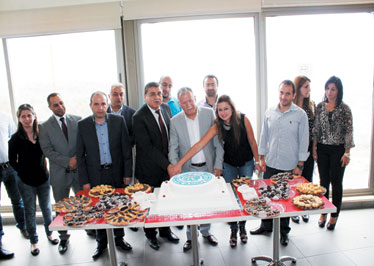
What are the principal majors on offer from the Issam Fares Faculty of Technology that satisfy the national and international demand for highly-qualified graduates in technology?
The Bachelor of Technology degree in a specialized area offered by the Faculty prioritizes the acquisition by students of the latest technological skills. As for the diploma offered by the Faculty, this trains the student to a high level of competence, not least because of the modern programs and state-of-the-art facilities currently in place. The available specializations are mechatronics engineering, telecommunications and networks engineering, civil engineering, agricultural engineering, aircraft maintenance engineering, business management and administration. The Faculty has plans in due course to offer more majors in such disciplines as interior design, topography, biomedical engineering, biological and biochemical analysis, and audiovisual skills.
On what Balamand campuses has the Issam Fares Faculty of Technology been established?
The Faculty has been established on the campus in Al-Koura, which is the main campus, the campus in Akkar, and the campus in Souk El-Gharb.
The University of Balamand has always been concerned about the development of its neighbourhood, especially the region of Akkar, so it decided to establish a faculty of technology there, obtaining the required license covering the fields of engineering, agriculture, business administration, and computer science. The region of Akkar was seen as a highly suitable location because of its urgent need for higher education in such disciplines. President Issam Fares offered to finance the project and further its goals, generously offering land for the campus as well.
How far has the Issam Fares Faculty of Technology, Balamand’s newest faculty, fulfilled expectations?
We do not consider numbers the only measure success. Since its launch, the Faculty has proved itself a worthy academic body, amply fulfilling the aspirations of its trustees and the vision of its president, Dr. Elie Salem. Since its launch on the main campus in 2010, and the one at Akkar in 2012, and finally the one in Souk El-Gharb in 2015, student numbers have progressively increased, making the Issam Fares Faculty of Technology today one of the biggest faculties in the University of Balamand.
Department of Agriculture and Food Industry at UOB An Adventurous Career
Q. What is the mission of the Department of Agriculture and Food Industry at the IFFT?
A. The Agriculture and Food Industry Program is a University technological and professional program serving the Agro-food supply chain. The program took off in 2012 at the Akkar campus and has recently received its first students at the Koura main campus.
The objective of the program is to graduate young motivated students in touch with their environment and with an excellent knowledge of the problems the agriculture and food industry sector is facing, a clear idea about how to face these problems, and the proper methodology and competences to solve them.
After three years completing a study program that includes 100 credits, two internships and a graduation project, students receive the degree of Bachelor of Technology in Agriculture and Food Industry Engineering. This, which equips them with the knowledge and competence to start a successful career, allows them to enter the professional sector.
Q. What are the strengths of this program?
A. As previously noted, the importance of this program is that it graduates professionals with a clear knowledge of the local agricultural and food sector; this can only be achieved through specialist training and field work.
Students start their field work in animal production (ruminants and small ruminants) during their first semester, at the Department’s Experimental and Training Center on the Akkar campus. Plant production training takes place in the Center’s green houses, nursery and open air field, with trials in collaboration with private sector companies (e.g., Robinson Agri, Antagro). As for the food industry training, it is performed in the Department’s food industry laboratories for dairy products and food preservation. Two periods of training for a total of three months are conducted with important public and private sector institutions such as the Lebanese Agricultural Research Institute (LARI), Hawa Chicken, Exotica, Ksara, Al Wadi Al Akhdar, to name just a few. Students can also spend their internship at one of our foreign-partner universities, such as one in France.
These course components are supplemented by a series of visits to major agriculture and food companies across the Lebanon to acquire necessary information about the sector’s needs.
Q. What are the potential employment opportunities?
A. Once they receive the degree of Bachelor of Technology, graduates can be hired for a position in management, advising, animation or training in the professional sector of agriculture and food industry. They can be given positions of responsibility in HACCP programs, ISO certification, quality management, product innovation and standardization, as well as production management and coordination in agricultural and food industry companies. They can also set up and manage their own small- or medium-size companies of Agribusiness.
Q. What are the different tracks offered by this program?
A. The program offers three major tracks:
Animal Breeding and Production Systems
Graduates should be capable of managing and solving all aspects relevant to animal production: management, zootechnics, nutrition, reproduction programs, animal health, products quality, sustainable production in relation to its environment.
Sustainable Management of Plant Production
Graduates should be able to manage all aspects of plant production and protection: agrosystem management, agricultural surface management, organic production, sustainable production, among others.
Food Industry Science and Technology
Graduates should be capable of managing an agri-food supply chain from the delivery of raw material to the food-processing plant up to the delivery of the finished product to consumers, while at every stage guaranteeing hygienic, nutritional and organoleptic quality.
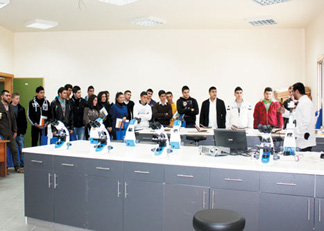
Q. What are the admission criteria for entry into this program?
A. The first prerequisite for applying to the Agriculture and Food Industry Program is a liking for adventure, for a career of adventure is what this path will lead to. Students with a Lebanese Baccalaureate (SG, SV or SE) or equivalent can apply. Students having obtained their BT diploma can also apply but will need to take remedial courses (Math, Biology, Chemistry, Physics, English and French). Applicants are accepted according to their SAT scores with or without remedial courses.
Q. What are the possibilities of academic insertion?
A. For those who wish it and have a high Baccalaureate average and robust language skills, Master’s programs in Agriculture and Food Industry can be pursued after following bridging courses either in Lebanon or abroad.
Want more information?
For more detailed information and up-to-date news about the Program, please contact:
Rodrigue El Balaa (PhD. Agr. Eng.)
Email: This email address is being protected from spambots. You need JavaScript enabled to view it.
Web: www.balamand.edu.lb - Facebook group: IFFT – AFID






